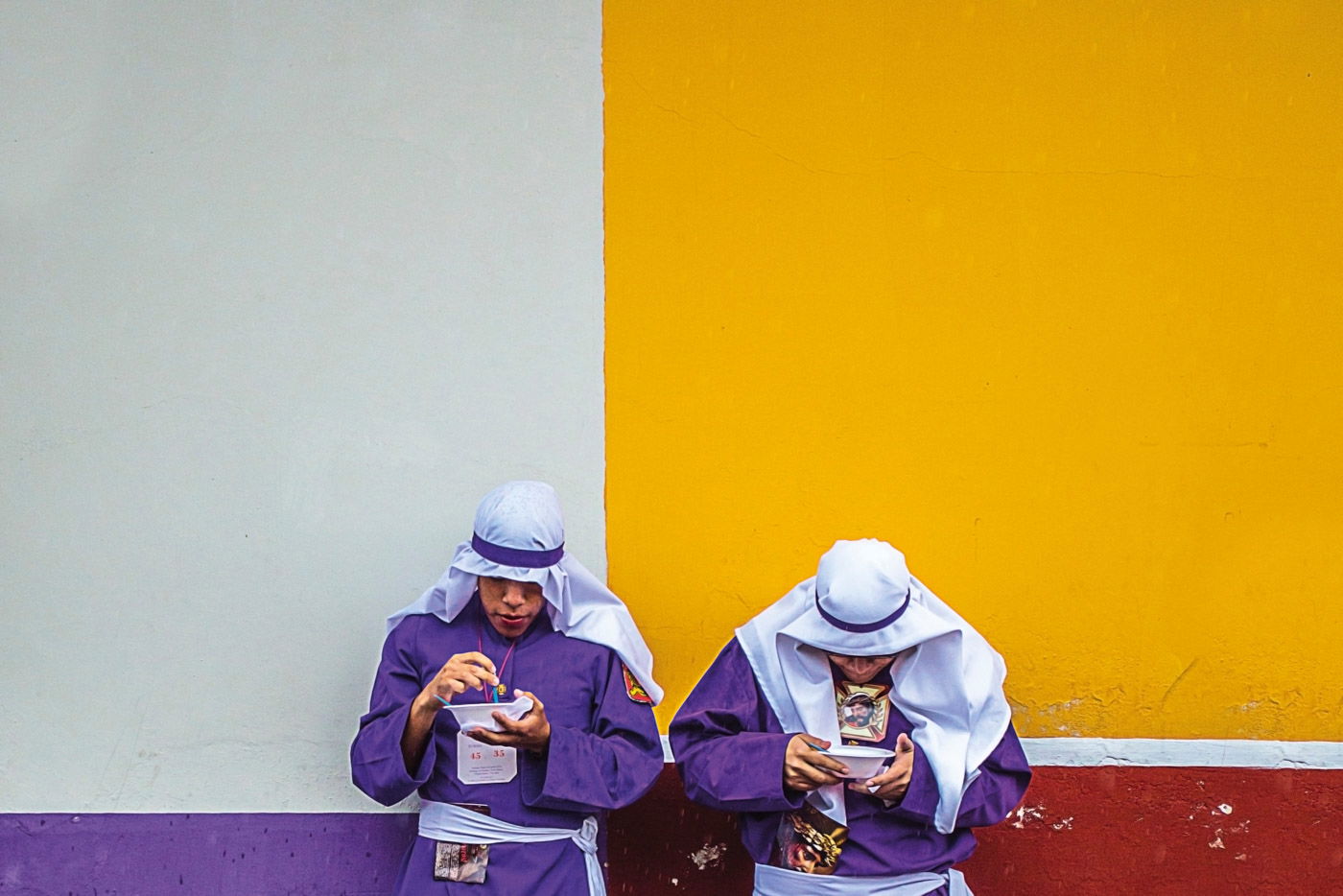Composite photography is breathing new life into digital image-making. Artists create original and unique composite images by combining photos with new visual elements. And they’re redefining the possibilities of digital photography.
If you want to create composite images, we’ll help you get started. We’ve got some fantastic composite photography ideas. And we’ll show you some of the finest examples of composite photos from exciting modern artists.
Composite photography is the art of combining two or more photos to create one new image. But a composite image isn’t simply one photo layered over another. It blends elements from separate images to create a seamless composite photo.
Double exposure was the only way to produce a composite image with a camera and traditional film photography. And we also saw the rise of collage that combines different images to make new compositions.
Digital technology now gives creators more freedom. They can use double exposures and other composition techniques with just a few clicks. And artists can combine photos to create amazing composite images using editing software like Photoshop.
Many artists use their own photos to create composite images. Others take a digital collage approach, using found materials and creating an original image. If you take the second approach, you can change the source material to produce something new.
Composite photography features elements of fine art, surrealism, and storytelling. It’s a genre that lets artists create the impossible. It makes fantasy a reality and brings dreams to life!
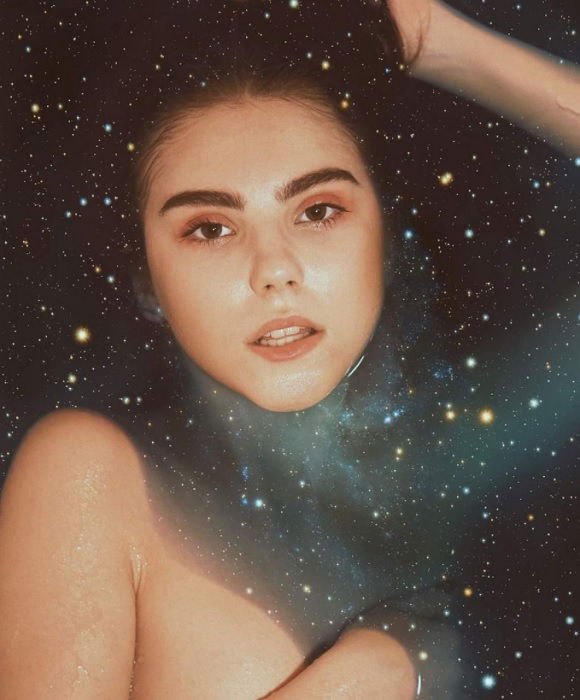
Now it’s time to get inspired. We have some excellent composite photography ideas for you to try.
We’ll give you superb composite image examples from the best modern artists. And you’ll have all the inspiration you need to start creating composite images!
Multiplying your subject is a great way to give your images a surreal twist. It’s a straightforward effect that’s easy to experiment with. And it’s the perfect way to start playing around with composite images.
Select your scene and set your camera frame for the perfect image. Using a tripod helps keep the camera in the same position for each shot. It also allows you to create self-portrait composite photos.
You can take a series of shots, each in a different pose. And the subject can interact with the scenery differently for each shot. Then you bring the photos together for the final image using Photoshop.
Natalia Seth gives us the perfect example of a duplicated subject composite image. In the photo below, she duplicated herself three times in one picture.
We see her walking from the house. And each replication is bigger than the last. It’s a simple effect, but it’s illustrative and fun!
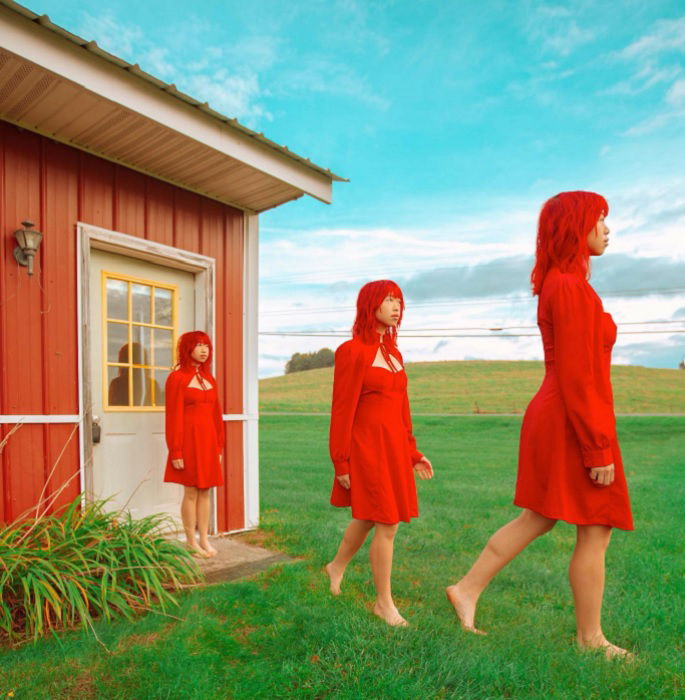
In the old days of film photography, double exposure was one of the only ways to create a composite image. With an analog camera, you expose the same film exposure twice to create two images in one!
Now, a modern composite photographer has far more options. You can easily combine two or more photos in Photoshop and overlay the images using a layer mask. Then you adjust the transparency of each photo with a few clicks.
All the images in the composite should be visible but with a certain amount of transparency. You want a ghostly and dream-like final image.
Andreas Lie is a master of the double exposure effect. His composite images have excellent shapes and textures, which give soft yet clear detail. His animal composites invoke the forest with a sense of mystery.
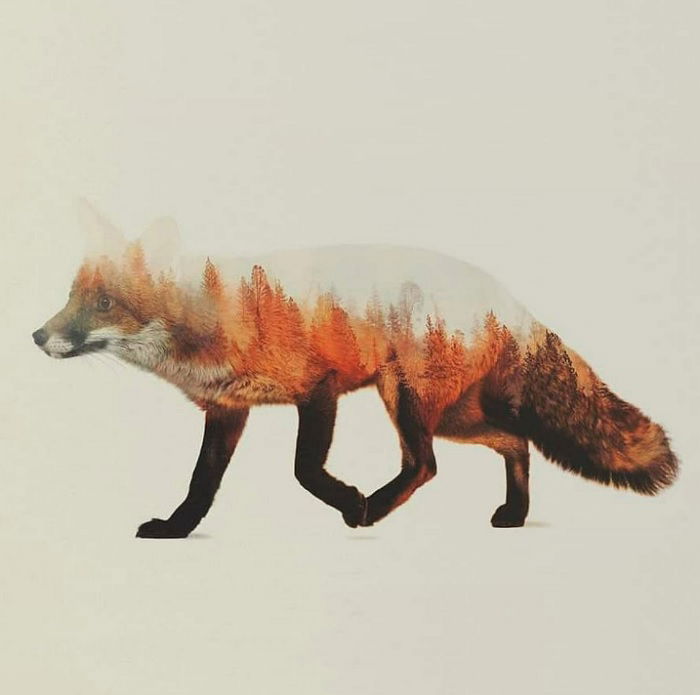
Composite photography and digital collage let artists explore the places they’ve always wanted to go. And the surrealist nature of this art means only your imagination can limit the destinations.
Outer space is a place of wonder and beauty. It’s somewhere many of us would love to visit, but it’s not an option right now. Composite photography allows us to create images that scratch this itch…. until commercial space travel becomes a reality!
Anna Maghradze captures these sentiments perfectly in her digital collage work. Below, her composite image shows a familiar car scene, with the family dog peering out the window. But outside, we see the universe’s glory with stars and galaxies in view.
Anna never combines more than two or three images, preferring to keep things simple. She focuses on the message she wants to portray. And here, we feel her longing for an interstellar road trip. It’s a great way to incorporate your astrophotography.
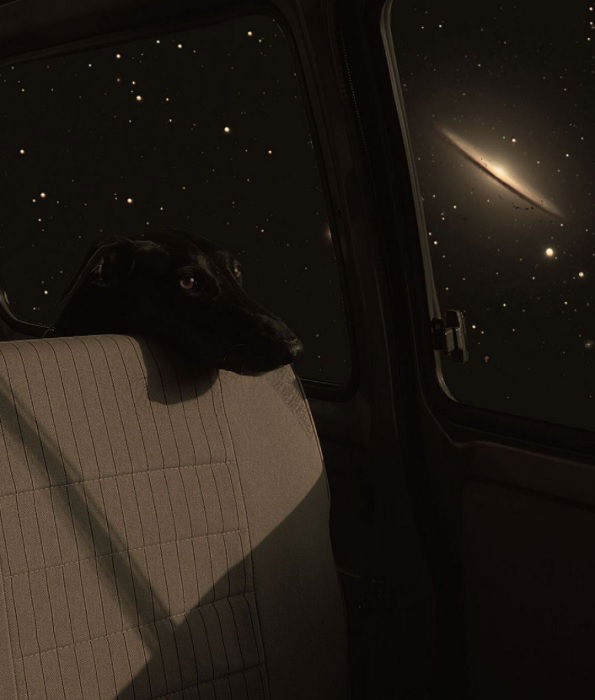
We all wish we had power over the weather and the seasons. We want to part the clouds and change night into day. In reality, we’re powerless. But composite photography gives us the power to change whatever we want.
Composite images often include juxtaposed scenes, like nighttime and daytime or Earth and outer space. But another interesting element is to have your subject interact with both. They can be the force that changes the environment and links the two.
Joel Robison creates fantasy-infused self-portraits. And in his composite image below, he’s interacting with the world around him by painting over a cloudy sky with a starry night sky.
Characters interacting with the world around them brings the image to life. They become self-aware, and they know they’re in a fantasy world. It’s a fun idea that creates a narrative in your composite photography.
This is a great example of how a subject can interact with a surreal environment. They can affect the change in the final image, revealing the new layer! You can check out Joel’s video course, Fantastic Photo Adventures, for more guidance and information!
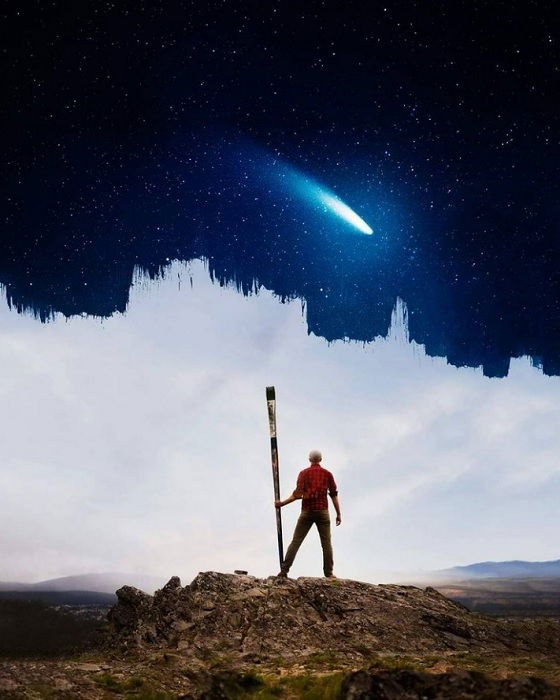
Landscape photography can be breathtaking. It shows us incredible locations that many of us will never experience in real life. But it’s a photo genre based very much on reality.
Composite photography lets you create landscapes that ask questions and make heads turn. You can combine different landscapes to make one stunning composite photo.
Charlie Davoli is an artist who loves to combine landscapes to create new surreal worlds. He often combines familiar scenes from Earth with shots of space.
But in the example below, he combines mountainous terrain with a towering cityscape. Each layer mask is blended seamlessly to create a natural scene.
Bringing contrasting landscapes together is a great idea for a composite image. But this can also send a message. It can raise questions about our struggling environment. Or it can make future predictions.
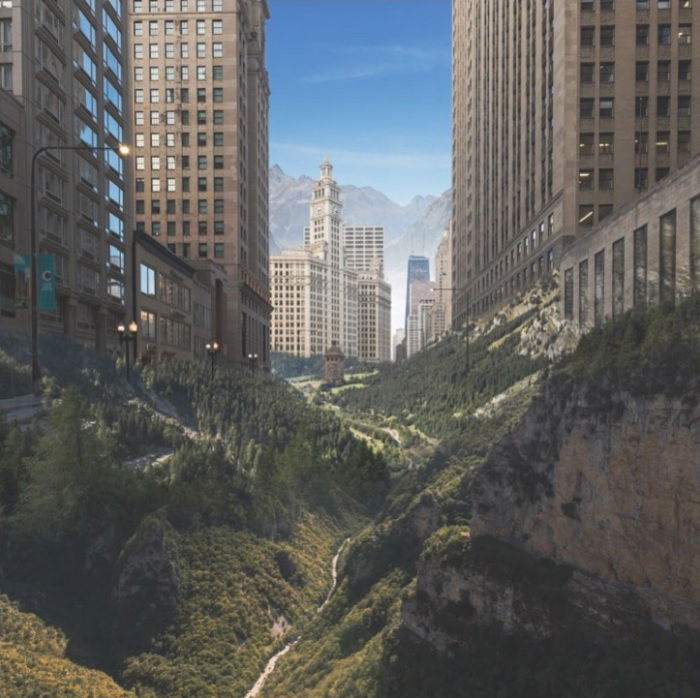
Composite photography gives you plenty of opportunities to use storytelling techniques. You can add visual elements to draw the viewer’s attention and have them guessing their larger meaning.
Add symbolic elements to the original photo, like animals, objects, and colors. They can be surreal and obscure. But if you select them with purpose, they can enhance the meaning of your composition.
Also, use the character of your image to advance the narrative. Viewers can be led down pathways or through doors. A strong composition leads the viewer’s eye, and they’ll follow the subject of your tale.
Fabiola is an expert storyteller. Her composite photography is full of narrative. And she takes you through a world of make-believe. Each scene is more magical than the last.
Her characters interact with the surreal world around them. And she uses visual cues to lead the story along. It’s a technique that brings the world to life.
In the photo below, her shrunken self enters a book-bound portal. She’s stepping into a story. And the magical imagery makes us want to follow!
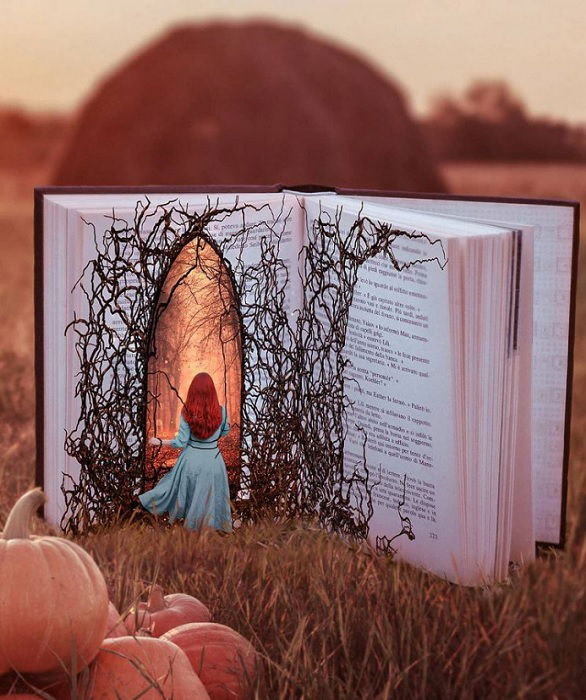
Composite image-making gives you so much freedom there’s often a temptation to go over the top. Adding another layer mask and incorporating more details into your photo is easy. But sometimes less is more. And a little restraint can produce some powerful minimalist imagery.
Minimalism relies on the power of simplicity. It’s about sharp shapes and clean lines that build a striking composition. You only need to inject a small amount of surrealism to affect your photo strongly.
Try adding just one or two foreign elements to your original photo. Kachna Lipa provides us with a perfect example in the photo below. She uses a stark, two-tone landscape.
And the addition of the diver may be a minor addition, but it’s enough to deconstruct the landscape’s reality. The power of the image comes from the simplicity of the composition.
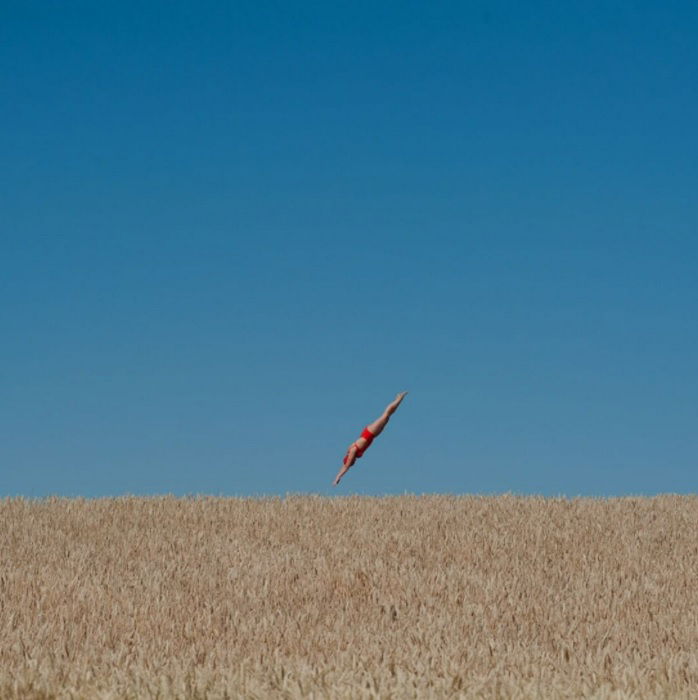
Composite photography is a great way to spread your creative wings and create unique and breathtaking images. It combines digital photography and creative photo editing to give you unlimited artistic freedom.
You can use replication and image blending for stunning effects. Or you can create surreal worlds that tell visual stories. You can fill your composite images with symbolism and action. Or you can take a minimalist approach.
I hope these composite image ideas inspire you to create your own surrealist worlds. You can look at our post on masters of photo manipulation for more inspiration. Or check out our Digital Dreamworlds eBook for tons of inspiration to create your next composite images!
